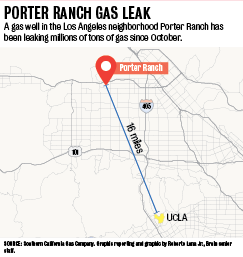One student stranded, another reimbursed after Porter Ranch gas leak

By Janae Yip
Feb. 2, 2016 7:30 a.m.
Charlie Jackson was looking forward to marrying his fiancee and graduating in the spring, but a gas leak in his hometown induced allergies and asthma symptoms that sidelined his plans.
More than 3,000 residents of the LA neighborhood of Porter Ranch have relocated to hotels and condominiums since the Southern California Gas Company natural gas well began to leak methane in October. Three million tons of methane have since been released and Gov. Jerry Brown declared a state of emergency Jan. 6, according to a state press release.
Gas company officials estimate the leak will be stopped by late February, and company workers began drilling in November to eventually patch the leak with cement, according to a SoCal Gas update. Officials are still investigating the cause of the leak.
“Porter Ranch has always been a beautiful and peaceful community, but ever since the gas leak, it’s been a ghost town,” said Jackson, a fourth-year psychology student.
Jackson said the gas company informed him of the leak a week after it started and did not provide him with information about relocating.
“The gas company called it a nuisance and didn’t give the leak as much importance as residents in the community thought they should have,” Jackson said. “After a while, it started smelling like a stove had been left on – it grew nauseating.”
Jackson and his fiancee began experiencing nasal problems in December and requested to be relocated. He said the gas company promised to find them a condominium within eight days, while they stayed at a Beverly Hills hotel, but ultimately failed to find one. Officials also promised to book them a hotel room in Thousand Oaks, California, after their first reservation expired, but were unable to find a vacant room.
“We were basically stranded with nowhere to go because it’s impossible to get a hold of anyone,” Jackson said. “We’re at the mercy of people who aren’t prepared for a disaster of this magnitude.”
Jackson said he has since moved back into his Porter Ranch home and has begun to use an inhaler. He added the gas company has not reimbursed him for food or hotel costs during his stay in Beverly Hills, though gas company officials promised to provide up to $300 a night for housing and $45 per day for food.
Carolyn Nguyen, a first-year chemistry student from Porter Ranch, was also relocated after the gas leak, but has been reimbursed and guaranteed a hotel room until March 1.
Nguyen moved to the Luxe Sunset Boulevard Hotel two weeks before winter break, after gas company officials sent out letters offering to relocate her and her family. Nguyen lives on the Hill, but sometimes stays at the hotel on weekends to study.
She added the company asked her family how many rooms they needed. Nguyen was given a hotel room near UCLA while her parents moved to a hotel in Marina Del Rey.
“It’s like being on an extended vacation,” Nguyen said, as she sat in an oversized armchair in her hotel room.
Nguyen’s suite is furnished with a flat-screen TV, a king-sized bed and a sitting area for guests, among other amenities.
Nguyen said the gas company reimburses her about every three weeks for living expenses and food. The gas company provides up to $350 per day per person for hotel accommodations and $45 per day for food. Nguyen said her parents encourage her to take friends out to four- and five-star restaurants such as Maestro’s and Stout Burgers and Beer to fully use the reimbursements.
Nguyen added she does not think the leak has negatively impacted her health.
Rui Wang, an assistant professor at the Luskin School of Public Affairs in environmental policy and air quality, said he thinks the leak offsets regional efforts of mitigating greenhouse gas emissions, but does not cause much environmental and human harm. Instead, the leak is part of a bigger question about how to effectively deal with aging infrastructure.
“Infrastructure will continue to fail more and more in the future, as the city continues to expand,” Wang said. “Cities need to find quick and cost-effective solutions to smartly detect problems and schedule upgrades for these systems.”
Wang added he thinks the long-term effects of the leak are difficult to estimate, but it’s important to focus on what can be done now.
“Officials have every incentive to contain the leak for the good of the climate,” Wang said. “But safety is the most important concern for residents right now.”

